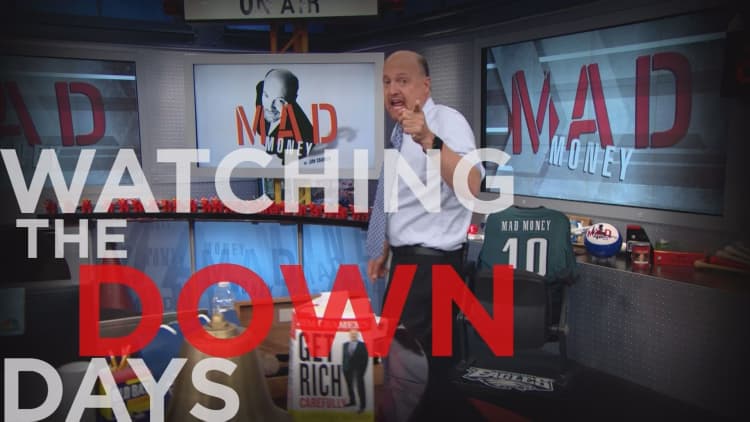
Sometimes, even the best stocks get hit hard by broader market sell-offs, and it's natural to wonder why, Jim Cramer said.
But most of the time, it's not because of some underlying weakness in the stock that investors didn't catch.
Nowadays, market sell-offs can happen because of index futures rather than actual fundamentals, an action that the "Mad Money" host said seems "at best stupid and at worst corrupt" and can drive investors crazy.
"The truth is, your inclinations are right and the action is every bit as stupid as it appears. There's no way to think of it other than negatively," Cramer said.
That's why investors need to remain level-headed in the face of widespread downturn. All markets will eventually go down, but you can make those declines work for you, not against you, Cramer said.
These days, futures run the show, and investors should never flinch at stocks going down despite strong fundamentals, he advised.
Stocks can also drop unexpectedly due to other investors shedding their shares for external reasons.
For example, "hedge funds that are under pressure to raise money might have to sell stocks that they believe in simply to have enough cash to meet other demands," Cramer said.
Those kinds of sell-offs can create major buying opportunities for investors, but Cramer insisted they remain cautious.
"Be careful not to get too bold, because you have no idea how big the losses are or how much cash the sellers need to raise," the "Mad Money" host warned.
There can also be times when smaller companies reflect poorly on their larger counterparts. Cramer called the effect "guilt by association," which can spur larger rotations in the market without much explanation.
"When you're dealing with high-growth companies that sell into the same arena — cloud, mobile, social, big-data analytics — you have shareholders who own these things only for the momentum and they can be blown out rather easily," Cramer said.
He suggested that investors think of high-multiple stocks as their own sector, since they are particularly vulnerable to market forces because "they're expensive and have no yield support."
"When your stock keeps coming down even though there's nothing wrong at the underlying company, ask yourself if there's a larger rotation going on," Cramer said. "If there is, you have a decision to make, cut and run or buy more."
Now that broader trends tend to drive the market more than individual stocks, Cramer said it's worth identifying specific metrics, or market measures, that can predict what most stocks in the index will do.
"If you think that higher oil correlates with economic growth, then you're most likely to set up a basket of stocks that does well when the economy is accelerating, and you can buy that basket every time oil goes higher," Cramer said.
Metrics can make or break your portfolio, and Cramer said investors need to realize that key metrics like oil, the dollar, and interest rates play a controlling role in the market and have the power to wreak havoc on stocks regardless of their strength.
Finally, Cramer explained why he's against investing in exchange-traded funds, or ETFs, which have seen a surge in popularity in the last several years.
Proponents argue that ETFs guard against "single-stock risk," letting you play an entire sector rather than putting all your money on one potentially bad stock.
Cramer doesn't buy that argument. "You want to be in a stock because it's the best name in a sector that's growing. You don't want to be in a group of mediocre stocks that will pull down the high-quality stock you've chosen," the "Mad Money" host said.
The "Mad Money" host made an exception for GLD, an ETF that tracks the price of gold, because of its accuracy, but on a larger scale, said that ETFs can distort stock valuations too dramatically for his liking.
"At the end of the day, I'm against ETFs because they often create enormous distortions that can obliterate even the best of stocks," Cramer said. "You have to accept a lot more risk if you own a stock that's particularly hostage [to] a given ETF."
Questions for Cramer?
Call Cramer: 1-800-743-CNBC
Want to take a deep dive into Cramer's world? Hit him up!
Mad Money Twitter - Jim Cramer Twitter - Facebook - Instagram - Vine
Questions, comments, suggestions for the "Mad Money" website? madcap@cnbc.com


